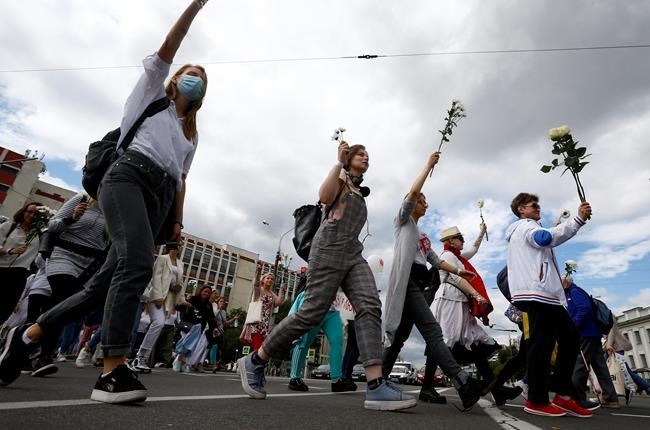
Belarusian women carry flowers on a rally in solidarity with protesters injured in the latest rallies against the results of the country's presidential election in Minsk, Belarus, Thursday, Aug. 13, 2020. Hundreds of people were back on the streets of Belarus' capital on Thursday morning, forming long "lines of solidarity" in protest against an election they say was rigged to extend the rule of the country's authoritarian leader and against a crackdown on rallies that followed the vote. (AP Photo/Sergei Grits)
Republished August 14, 2020 - 11:32 AM
Original Publication Date August 14, 2020 - 12:36 AM
WARSAW, Poland - Lithuania is relatively small by European Union measures, but it is playing an outsized role as protesters in neighbouring Belarus face a brutal law enforcement crackdown following a presidential election they say was rigged.
As the EU’s foreign ministers meet Friday to discuss the crisis, the Lithuanian government's strong pro-democracy voice rooted in decades of resisting Soviet control also serves as a reminder of the bloc’s uneven response so far.
Lithuania has given refuge to Sviatlana Tsikhanouskaya, the main opposition challenger in Sunday's disputed election that Belarusian President Alexander Lukashenko claims to have won with 80% of the vote after 26 years of authoritarian rule.
Belarus's northern neighbour also is “ready and considering the possibility of accepting Belarusians, suffering from the ongoing brutalities, on humanitarian grounds,” Lithuanian Foreign Minister Linas Linkevicius tweeted on Wednesday.
At the EU meeting Friday, Linkevicius said he called for a special session of the UN's Human Rights Council, sanctions against individuals for use of excessive force and election fraud and the establishment of an EU fund for victims of repression.
With nearly 7,000 people detained and scores injured, the fierceness and scope of the police response to post-election protests was extraordinary even for Lukashenko’s long, iron-fisted tenure. The 65-year-old former state farm director has been in power since 1994 and was nicknamed “Europe’s last dictator” in the West for his suppression of dissent.
Lithuania's support is longstanding. Lithuania's capital, Vilnius, is located just 170 kilometres (105 miles) from Minsk, the capital of Belarus, and already has become a centre for Belarusians in exile. The city hosts a university that Lukashenko banned. A number of Belarusian nongovernmental organizations have relocated there.
Why the rights of citizens in Belarus matters so much to the people of a small Baltic nation with a population of 2.8 million is rooted in Lithuania's history.
The country was the first former Soviet republic to declare its independence. After that historic step in 1990, Lithuania embraced democracy, joined NATO and the European Union, and then turned to promoting democracy abroad as well.
Many Lithuanians, remembering how members of the Lithuanian diaspora supported the independence movements back home, felt a special responsibility to help those with similar aspirations elsewhere in eastern Europe, particularly Ukraine and Belarus. In international forums, Lithuanian officials have often promoted issues of democracy in those two countries.
“Having this historical experience, we believe it’s necessary to support people in Belarus and Ukraine who want to support democracy in their country,” said Laurynas Jonavicius, an assistant professor with the Institute of International Relations and Political Science at Vilnius University.
“It became a part of Lithuanian identity to be a beacon of democracy and a regional leader in democracy promotion,” he said.
Belarus, located on a strategically important fault line between Russia and Western-oriented NATO countries, poses a difficult challenge to Western nations amid the large anti-Lukashenko protests. They have largely kept their distance to Belarus, which has strong ties to Russia, and a strong push for a Western-oriented direction there could also exacerbate ties with Moscow further.
Other countries in the region with communist-era memories of corrupt and authoritarian leaders also have also spoken out on behalf of the anti-government protesters contesting that Lukashenko fairly won reelection to a sixth term.
Slovenian Prime Minister Janez Janša said Thursday his government was trying to create pressure on Lukashenko to agree to repeat the election under the strong watch of international election observers, saying it would be “the only peaceful solution for the current crisis.”
Like Lithuania, Poland, an EU member since 2004 that also borders Belarus, has also long been a proponent of democratic change in its autocratic neighbour. The Polish government for years has funded a satellite TV channel, Belsat, that broadcasts news into Belarus as an alternative to government propaganda.
On Friday, Prime Minister Mateusz Morawiecki announced a five-point plan to help Belarusians which would include support for victims of government repression, including people injured or dismissed from work.
The “Plan of Solidarity with Belarus” also includes opening Polish universities to Belarusians students and scholars, as well as supporting independent media and civil society in Belarus.
Morawiecki said Poland was allocating 50 million zlotys (11.4 million euros; $13.4 million) for these efforts, which would be in addition to other spending already earmarked for existing programs like Belsat.
“Our security cannot exist without the security of Belarus. We want to show that Belarus can count on Poland’s solidarity,” he said.
But Poland’s voice at the EU level has been weakened by a perception that Poland’s own government is eroding democratic standards with laws giving the ruling party more power over the judicial system and anti-LGBT rhetoric.
While Poland was a strong voice for democracy in Georgia and Ukraine in the past, some Polish commentators in recent days have observed Lithuania taking on the leading role that Warsaw once had at the EU level.
“Lithuania has taken Poland’s place on EU’s eastern policy,” the liberal daily newspaper Gazeta Wyborcza, which is highly critical of Poland’s right-wing government, declared in a headline Thursday.
___
Matthew Lee in Bled, Slovenia, and Liudas Dapkus in Vilnius, Lithuania, contributed to this report.
News from © The Associated Press, 2020